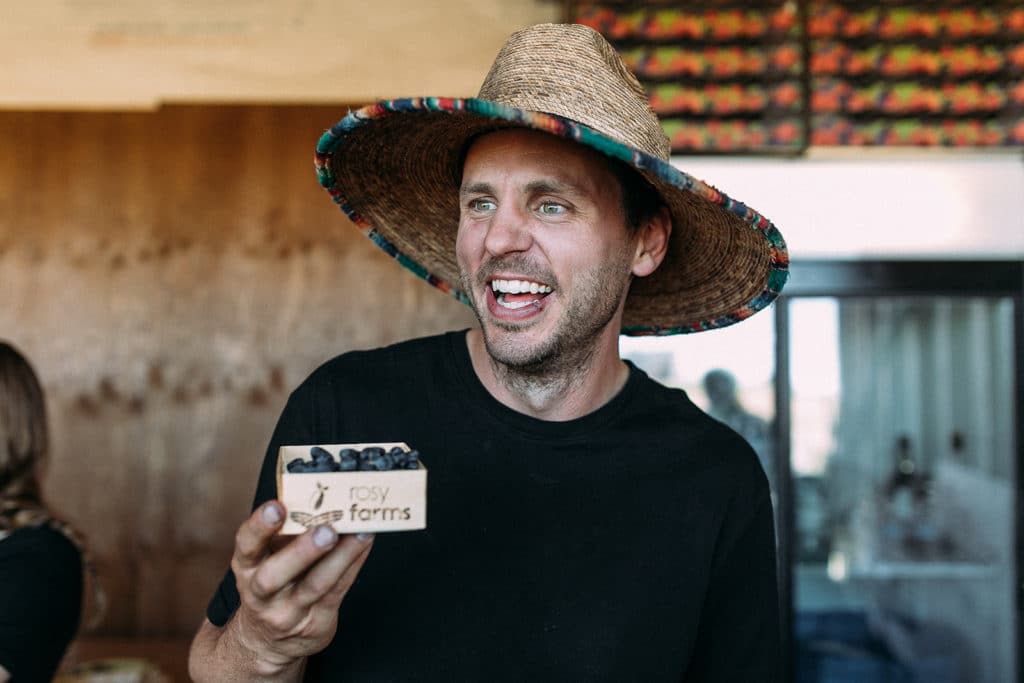Hungry deer, voracious bugs and a funny-shaped berry led Andrew Rosychuk to start his own business and look at value-added in a new way.
Andrew Rosychuk is one of the latest Nuffield Scholars. The Nuffield Canada Scholarship is a rural leadership program available to anyone mid-career who is involved in agriculture in any capacity of primary production, industry or governance. Each year scholarships are awarded to individuals who are expected to assume positions of greater influence in their field in the future. This is Part 1 of a three-part series.
For Alberta’s first commercial haskap grower, Andrew Rosychuk comes from an unlikely background.
He’s a city boy who always wanted to be a farmer. His dad grew up on a farm but left it to become a lifelong civil servant for the City of Edmonton.
“He got off the farm because he didn’t want that lifestyle. This is a business fraught with risk. It felt strange getting into something he never really intended for me,” says Rosychuk, the 34-year-old owner of the Alcomdale-based Rosy Farms, Alberta’s first commercial haskap operation.
In 2005, while taking the production horticulture diploma program at Olds College, he started growing haskap — 200 plants.
He continued experimenting by planting sour cherries and currants as well. The deer loved the sour cherries, bugs loved the currants, and he fell in love with the haskap, a blue oblong berry whose flavour is often described as a cross between blueberries and raspberries.
“All of my life experiences have culminated together in this love and passion for horticulture. Constructed from nothing, this is a haskap farm that I believe will change the fruit industry in Canada,” says the city slicker-turned farmer.
Rosychuk is a co-founder of North 49 Fruit Corporation, a producer-owned marketing corporation bringing Canadian-grown fruit and processed fruit products to the global marketplace. It’s a new model that he believes will help Alberta fruit growers avoid the mistakes of the past.
“We’ve created a new company to bring stability to a brand-new marketplace. It’s a volatile industry,” he says, referring to early efforts to market the Saskatoon berry that ultimately didn’t work.

His Nuffield study will focus on the value in developing on-farm, medium scale processing units, giving the primary producer an advantage in capitalizing on a value-added ingredient or product.
“Right off the bat, one of the first things I was told by experts was, ‘It’s great you have a farming operation, but there’s so much more going on out there that you should get involved in and incorporate into what you do.’ The result is a worldwide network of people who can support each other to be successful.”
Part of that network includes Yoichiro Hoshino, a haskap breeder at Japan’s Hokkaido University.
“I think what Andrew is doing is hugely valuable,” he says. “Canada uses a lot of Japan’s genetics for its haskap varieties. In the future, in order to develop new varieties, we are considering incorporating Canadian native haskap genetics into our breeding. In order to do so, I think it is necessary to investigate the distribution and genetic diversity of haskap throughout Canada.”
Rosychuk says Canadian haskap has come a long way in recent years, having been built on genetics originating from Japan and Russia. But there is more work to be done.
For him, it’s about opening up a new world for haskap as he carves a path for himself and people like him — people he says are not typically associated with the ag community.
“I wasn’t born into this, so I had to build things myself. I’m going to continue to build and create something new and better.”











